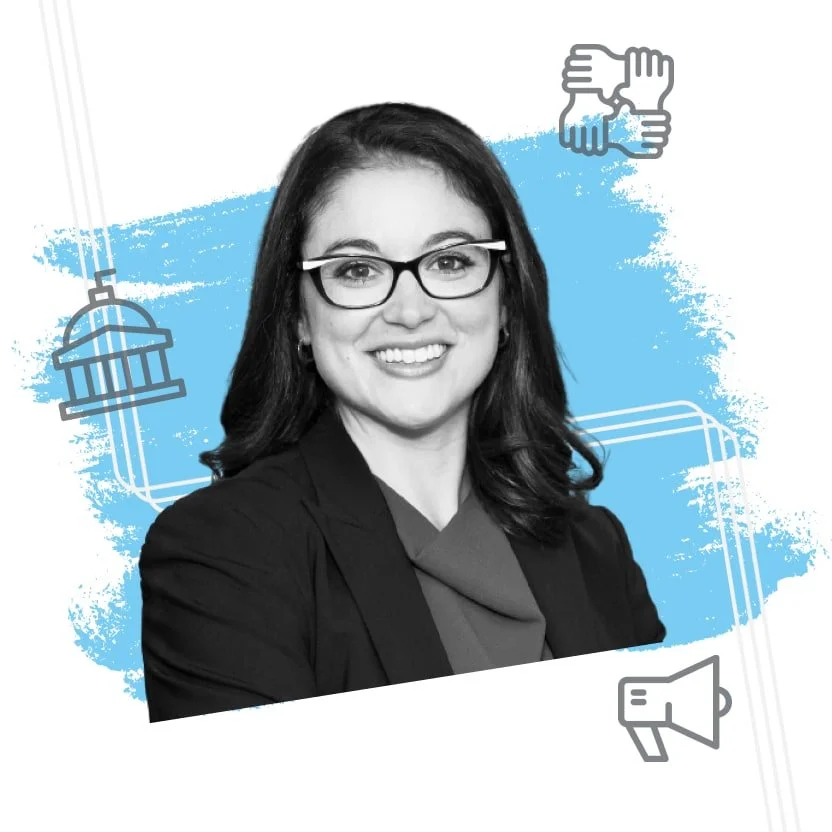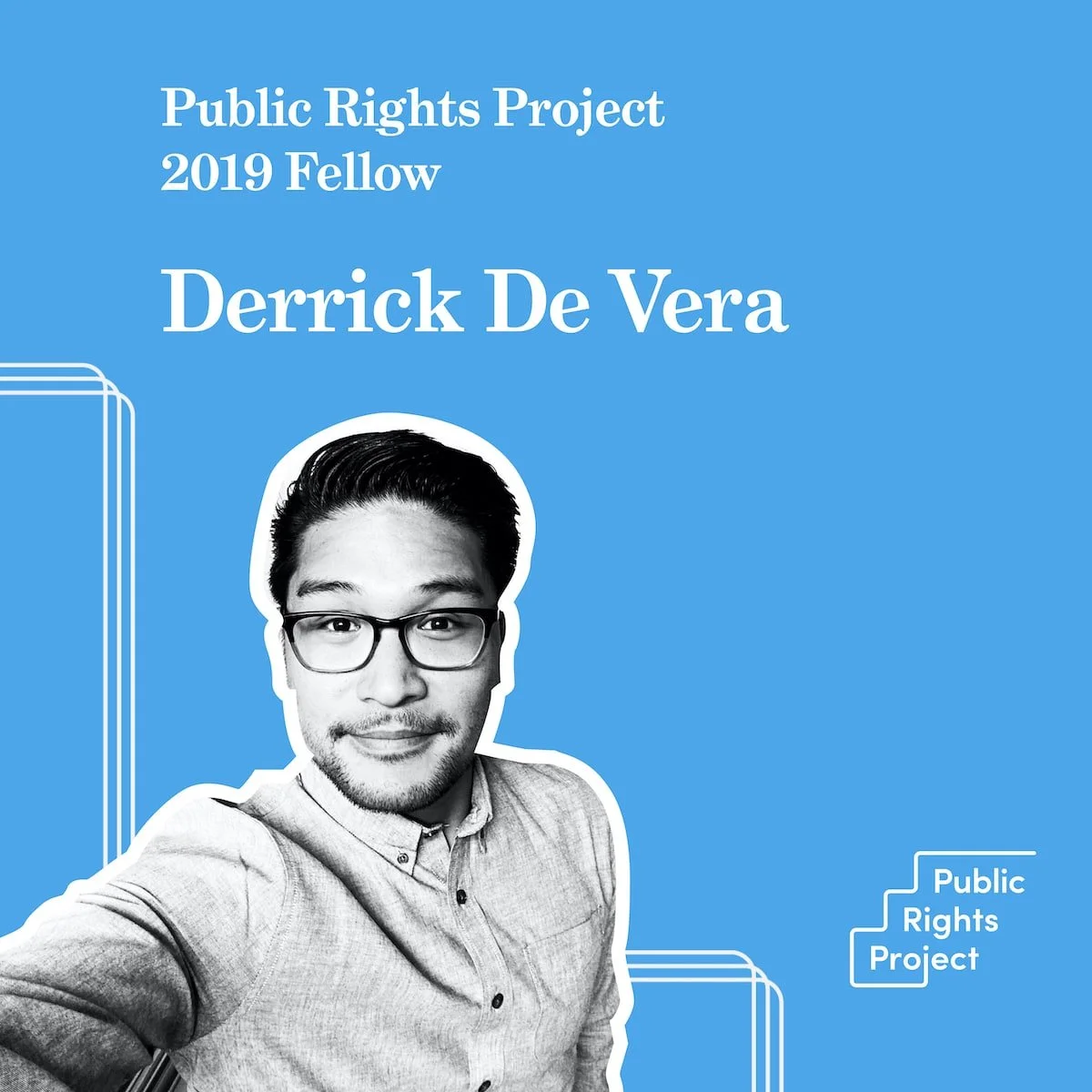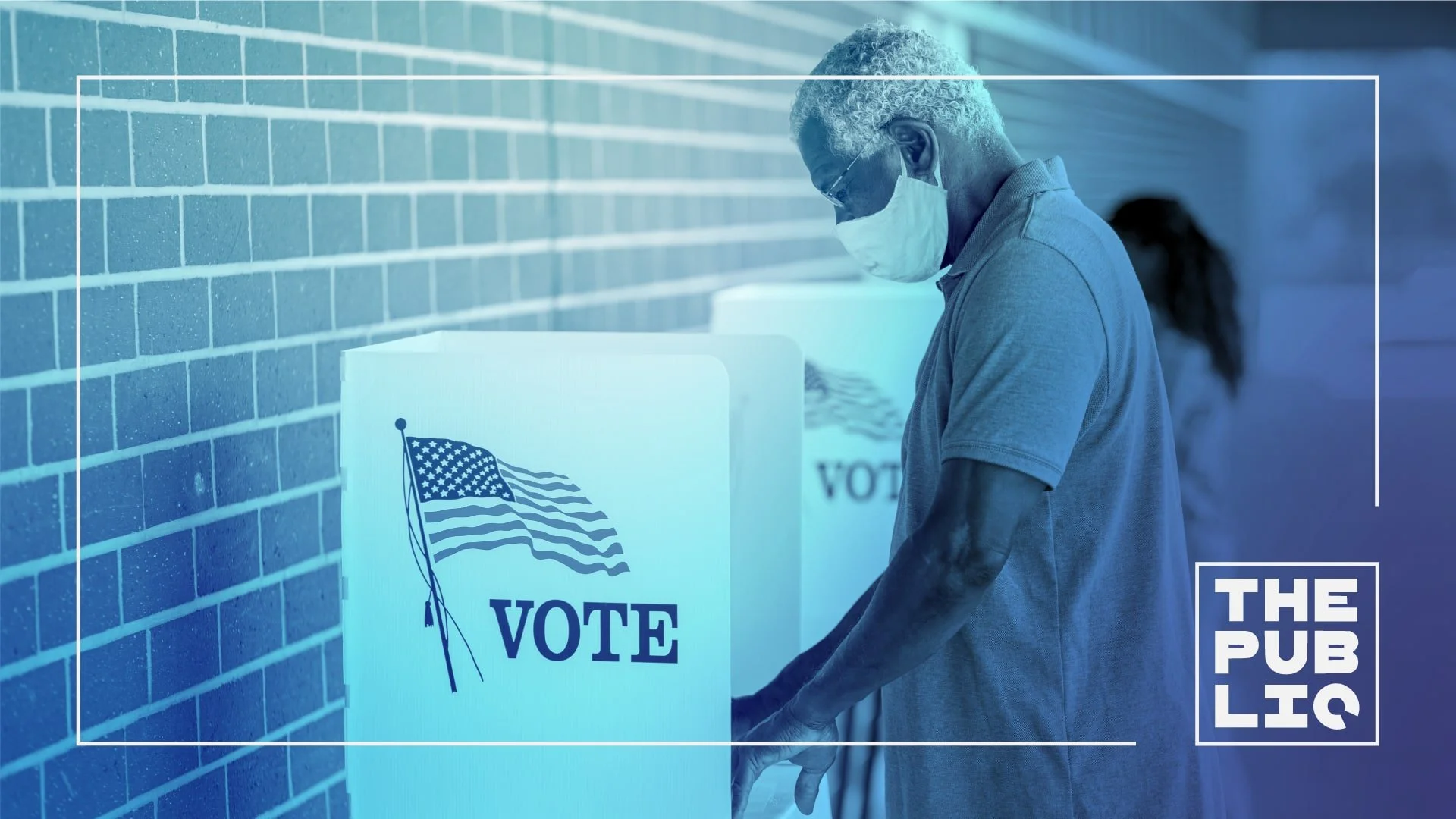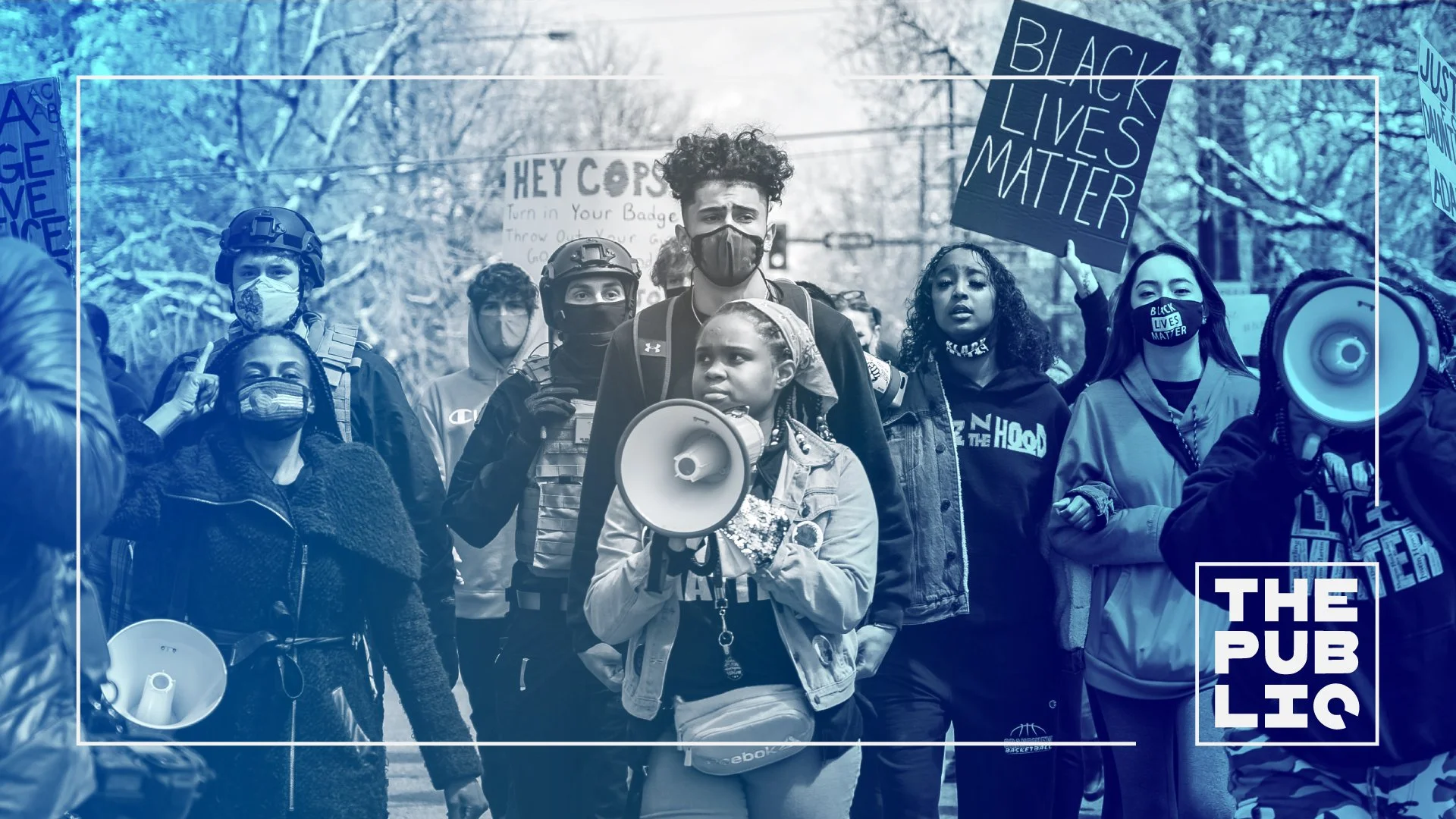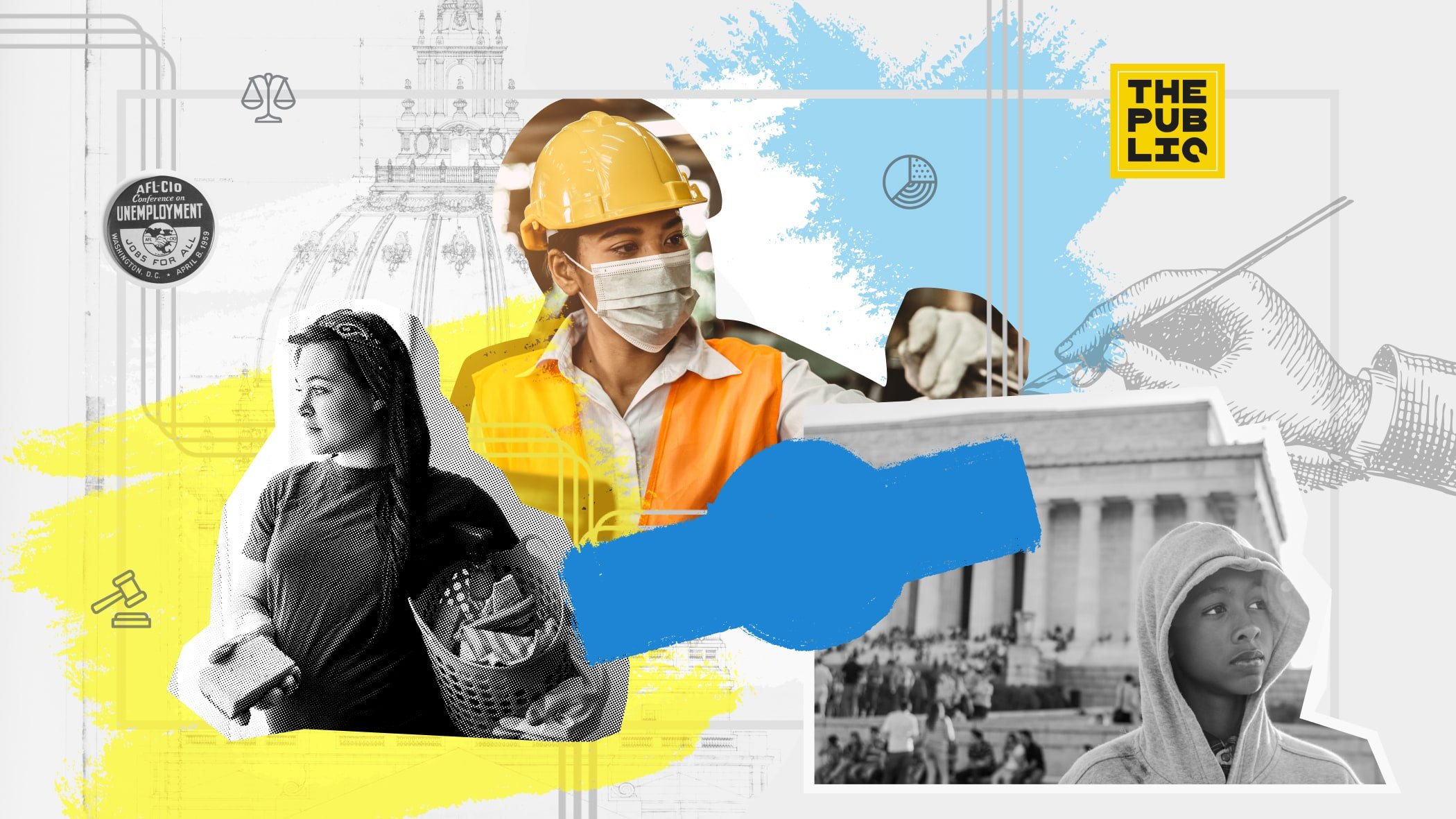
Public Rights Project Annual Report
2021 – A Year In Review
We’re protecting our most underserved communities by changing the way state, local, and tribal governments enforce laws.
Theory Of Change
Making Equitable Enforcement A Reality
All people are entitled to the rights that the law promises them—fair wages, safe housing, non-discrimination, clean water and air, and beyond. And yet, these legal rights are often not enforced.
More than half of Americans suffer from violations of their legal rights, despite laws that should protect them. People of color, women, low-income people, and young people are most likely to be victims of such abuse and victimized repeatedly.
Despite myriad laws that help protect people from bad actors like predatory employers, discriminatory agencies, and scamming corporations, these laws are still repeatedly broken. But why?
-
Whose job is it to make sure that civil rights laws are enforced and that those who commit crimes against our communities are held accountable?
The fact is, legal functions of state and local government—City Attorneys, District Attorneys, and State Attorneys General—have tremendous power to protect our most basic rights and freedoms. However, they often don’t have the right people in the right jobs with the skills needed to bring impactful cases.
Even more challenging, activists, organizers, and communities of color can often have an adversarial relationship with government—and understandably so. Even when governments want to listen, they still put the burden on residents to share information about potential cases. Therefore, they often do not hear from communities that have borne the brunt of poverty, discrimination, and mass incarceration
But we know the world we live in isn’t inevitable; something can be done. And that’s where the Public Rights Project’s (PRP) mission comes to life.
PRP facilitates the changes we want to see in government by building and investing in a network of equitable enforcers—strong public service lawyers—and activating that network through targeted advocacy campaigns.
In addition to offering skills training, leadership development, and cohort-based peer learning to our network, a mission-critical aspect of our work involves building bridges between government and community. We initiate digital outreach to community members, training on community engagement, and partnerships with community-based organizations.
We also invest in building a research base to inform our services in order to make clear the impact of equitable enforcement as a field and empower impacted residents to shape our network’s advocacy efforts. Our network partners combine resources to take on powerful adversaries that would be beyond the capacity of any one office, and they learn from each other as much as they learn from us.
We know this network model is critical to generating local and national impact by helping state, local and tribal governments implement a scalable, community-accountable model to enforce their residents’ legal rights. We believe the network is the key to seeking economic, racial, gender, and environmental justice, and to closing the gap between the promise of our laws and the lived reality of marginalized communities.
Challenges And Opportunities
Reflections From Our Founder And President Jill Habig
2021 was not the year that many of us hoped for: An insurrection, an enduring pandemic, intensified threats against Black and Brown lives, and a Supreme Court poised to set reproductive rights back five decades.
And yet, through all the hurt, struggle, disappointment, and uncertainty, we’ve also seen growing movements. Working people are organizing in rapidly rising numbers. Advocates are pushing for long-overdue overhauls of policing and public safety, demanding protections that include all of us, not just some at the expense of others.
And local governments across our network are listening. They are not just settling for “business as usual” that pits the government against the communities they’re supposed to serve; they are using their power to become allies and advocates.
In Minnesota, Attorney General Keith Ellison got a conviction against Derek Chauvin for George Floyd’s murder. In Ann Arbor, Austin, Philadelphia, and San Francisco, local prosecutors are building new workers’ rights units to prosecute corporations for abusing and cheating their workforce. In Florida, nine cities have joined a coalition with local advocates to say no to Gov. DeSantis’s racist, anti-democracy policies in HB1.
This is not an easy time to be a public servant, and not an easy time to be a believer in government. But 2021 has convinced me that this moment is an incredible opportunity to rewrite the rules of our democracy.
It is a moment that requires effective, equitable government more than ever. It is a moment that demands not just one or two cities working for change, but a national network of public servants equipped to use their power to reimagine justice.
I'm so proud to work with incredible champions of equity across the country, whose work inspires me every day and convinces me that a different world is within our grasp. I hope you will be as awed by our network as I have been, and inspired to continue the fight with us for another year.
In solidarity,
Jill Habig
Founder and President
In The Media
Stories From Across The Country
From news about the gig economy and workers’ rights to important perspectives from those fighting for racial justice, these are the most important headlines from across our network.
Labor enforcers in Philadelphia, Seattle and Chicago write there's "a strong likelihood" the company is misclassifying its workers as independent contractors, allowing it to avoid certain responsibilities it would have as an employer under existing labor laws. (CNN)
The issues at play in the Handy suit are real crime. This gig work company has been stealing from its workforce and exposing people to sexual harassment and assault without offering any protections. (Sac Bee)
HB 1 is fundamentally racist in nature: The governor made it his top priority as the nationwide movement for racial justice took hold following the death of George Floyd. (Gainesville Sun)
Gainesville, Tallahassee, and seven other cities filed suit Tuesday against Gov. Ron DeSantis and the rest of the cabinet seeking to invalidate sections of the state’s new “anti-riot” law that restrict cities’ ability to make budget changes involving police. (The Miami Times)
When Florida lawmakers passed HB1, the 2021 version of repressing resistance to police killing Black people, Governor Ron DeSantis and other lawmakers focused on demonstrations happening across the country, just as in 1967. (Community Justice Project)
As cities, we should collaborate with common interest and purpose to reimagine different approaches to policymaking and systemic problem solving. (Law.com — The Recorder)
In this emergent wave of prosecutor reform, district attorneys must foster a new vision of public safety, centering economic security as an integral piece of a community’s well-being. (American Constitution Society)
Multiple actions fall under economic justice, defined by the Prosecutor’s Office as holding “those who unlawfully impose economic harm accountable.” (All About Ann Arbor)
A nearly two-hour long argument in Dobbs v. Jackson Women’s Health Organization did not just confirm the court’s clear intent to overturn Roe and Casey formally; it demonstrated a conservative majority of the court focused on going much further and undoing a range of long-standing precedent that impact the equality and dignity of most Americans. (Daily Journal)

Legal Advocacy
The Fight For Rights
In 2021, we worked on seven vital cases pushing back against some of the greatest threats to a functioning democracy and an equitable society. Our litigation in state and federal courts, including filing amicus briefs, helps mobilize governments to take action for marginalized communities.
“At PRP, we have built the nation's only community of practice focused on equitable enforcement. We share strategies, opportunities, and struggles. We combine resources to take on powerful bad actors that would be beyond the capacity of any one office. Together, and through our network, the field is expanding and strengthening each year.”
— Jonathan Miller, Chief Program Officer
Legal Advocacy At A Glance
Major Case Highlights
Racial Justice
Florida’s Anti-Protest Law HB1
HB1 is a direct backlash against the Black Lives Matter mobilizations that strengthened in the wake of the murders of George Floyd and Breonna Taylor. The law is intended to criminalize protests and punish local governments that take action to reform their police departments.
We can’t let it stand, so we’re suing Gov. DeSantis with a coalition of nine cities and community partners.
-
“…there are predominantly white, Southern legislators that are using preemption to really entrench white supremacy and take the local decision-making power away from us, from communities of color.”
— Gail Johnson, Activist, Organizer, Former Gainesville City Commissioner
-
Florida policing accounts for a quarter to nearly half of local budgets, while the average city spends a mere 5% of funds on public housing.
Source: Cities Grew Safer. Police Budgets Kept Growing -
“We always have to consider history to understand how we got here. Criminalizing Black-led protests in Florida is a tradition rooted in the suppression of Black folks asking for basic rights and fair treatment in this state.”
— Nadege Green, Director of Research for the Community Justice Project, our partner in the case.
Public Health
State Of Texas v. City Of Austin, Travis County
In early March, Texas Governor Greg Abbott issued a new executive order under the Texas Disaster Act. The Texan reports that Abbott “exercised near-unchecked authority over the state, its citizens, and their exploits,” lifting most COVID-19 restrictions statewide, and prohibiting local governments from enforcing mask mandates.
State of Texas threatened the ability of local public health authorities to organize and act during public health emergencies and encourages clampdowns on local governments’ ability to conduct routine public health activity both within Texas and nationwide.
We authored a brief alongside the Local Solutions Support Center (LSSC) and the International Municipal Lawyers Association (IMLA) to fight back against this challenge. 10 law professors and four public health organizations joined our brief.
“By blunting the ability of cities and counties to respond to today’s public health emergency, conservative leadership aims to weaken future local government action; this is so much bigger than COVID.”
– Michael Adame, Staff Attorney, Public Rights Project
Reproductive Justice
U.S. v. Texas + Dobbs v. Jackson Women's Health Organization
We filed two amicus briefs against two different states attempting to strip women of their reproductive rights and bodily autonomy: Texas's SB8 and Mississippi's Dobbs v. JWHO.
A right-wing Supreme Court is poised to overturn Roe, the only ruling keeping 22 states from severely restricting or banning abortion. This change would disproportionately harm women of color and low-income women, as well as prevent local governments from bridging sharp disparities in healthcare.
We can't let Roe go down without a fight. We're standing up against these attacks on women's liberty.
-
In blatant violation of the constitutionally-protected right to abortion, SB8 prohibits abortion after a “fetal heartbeat” is detected (generally at six weeks of pregnancy and before most women know they are pregnant) and grants authority to private individuals to sue anyone who performs or helps in the provision of an abortion.
-
Mississippi has one of the worst wage gaps in the country for Black women. According to a 2018 report, a Black woman could make $830,800 less than the average white man over the course of a 40-year career.
Source: Mississippi Today, Wage gap for Mississippi’s black women one of nation’s largest
-
“If you take away the rights of a woman to choose, what else are you going to take away? No one has the right to tell a woman what to do with her body, but abortion access is also an economic security issue.”
— Cassandra Welchin, Executive Director, Mississippi Black Women’s Roundtable (MSBWR)
Workers’ Rights
Cedar Point Nursery v. Victoria Hassid
Cedar Point cripples the ability of unions to organize in the agricultural sectors and hampers local governments’ ability to conduct routine inspections designed to protect workers, consumers, tenants, and the environment from an array of hazards and potential harms.
In the wake of Cedar Point, businesses will be further emboldened to challenge more regulations in court and government agencies will be reluctant to enforce them.
Public Rights Project’s amicus brief (PDF) was cited by Supreme Court Justice Breyer.
“Labor laws have always been inextricably linked to race, class and immigration status. Farmworkers remain some of the most exploited, working in unsafe conditions with rampant wage theft, sexual harassment, and retaliation.”
– Caitlin Vega, longtime labor advocate and founder of Union Made
Workers’ Rights
People Of The State Of California v. Handy
Gig-based tech companies have based their entire business model on exploiting and misclassifying their workers. How do we make this billion-industry ethical and hold it accountable to contractors?
Following hundreds of interviews and surveys with workers, we launched a campaign against Handy, the gig-based home cleaning and maintenance company, for misclassifying and exploiting their workforce.
Since then, five county and city governments — and half of Handy's top largest markets in the U.S. — have filed suits or launched investigations of the company.
-
240 workers shared their stories with us and our partners for case development and spreading public awareness.
-
16% of American residents — or 41 million people — did gig work in 2021.
Pew Research, The State of Gig Work -
“For people who are undocumented, — people who are vulnerable, — it’s just worse all around. You’re stuck, and you feel powerless. I sincerely hope for a change in the situation so I won’t have to deal with this anymore, and I’m really glad to know in a way I’m not the only one.”
– Sophia, Handy house cleaner from NY, NY

Fellowships
Building The Bench Of Public Service Leaders
Our fellowship programs help move the needle toward justice, catalyze social change through community engagement, and bolster affirmative litigation that supports public interests.
From The Fellows
What Does Equitable Enforcement Mean To You?
Fellows are invested in innovative strategies that will enforce residents’ civil and legal rights—in policies that center people of color and working people over profits.
Fellowships At A Glance
16 active fellows
40 fellows graduated in 2021
89 total fellows since 2017
“The justice system was designed with a privileged class of people in mind and has routinely been used to protect and maintain a system of inequality. Equitable enforcement not only holds the privileged class accountable for harms they cause, but also proactively addresses the social and economic disparities that cause crime in the first place.”
— Sara Zollner, a PRP/Justice Catalyst Fellow // Economic Crimes Against Workers Unit at the San Francisco District Attorney’s Office
“The enforcement of our laws is an expression of political power. Systemic injustice exists in the U.S., in part, because the laws of our country have traditionally been enforced to privilege the few and benefit the powerful. Equitable enforcement attempts to correct this course of history by marshaling public resources to defend rights and address harms that the United States’ justice system has historically ignored or dismissed.
— Stephanie Gharakhanian, PRP Fellow // Travis County District Attorney’s Office in Texas
“Equitable enforcement means everyone plays by the same rules, no matter how much or how little power you hold. The American legal system has always had different rules for different people; equitable enforcement is the notion that our country can move beyond those systemic biases and disparate impacts. Only by ensuring that the law truly and fairly applies to everyone can we do the hard work of pursuing justice.”
— Brian Remlinger, a PRP/Justice Catalyst Fellow // Michigan Bureau of Elections
“To me, equitable enforcement means holding polluters and corporations responsible for harm to a tribe’s lands, resources, and people, while using restorative justice and education-based strategies within our own communities to advance proper environmental care. Historically, indigenous land stewardship has been ignored and disrupted in favor of over-consumption and profit. In working with tribes to exercise tribal sovereignty through environmental law enforcement, we are continuing a tradition of indigenous resistance.”
— Melodie Meyer, a PRP/Justice Catalyst Fellow // Yurok Tribe Office of the Tribal Attorney, Klamath, CA
Fellows’ Work
Fellows’ Impact Across The Country
Our fellows work in government offices across the country on civil rights, economic justice, and environmental justice issues that directly impact underserved communities. We're proud of the tenacity and vision that informs their public service, as well as their commitment to equitable enforcement.
Crown Act
Kimberly Fayette, a PRP/Justice Catalyst fellow in the NYC Commission on Human Rights, is taking on workplace discrimination based on hair. The Crown Act created new guidelines to protect New Yorkers and give legal recourse to individuals who have been harassed, threatened, punished, demoted, or fired because of the texture or style of their hair. 13 states have now passed The Crown Act and there is a federal proposal to make it the law of the land.
“When it comes to racial justice work or hair discrimination, local governments are a powerful, important, and underutilized agent of change.”
— Kimberly Fayette
Fair Housing
Colin Stroud, a Public Rights Project fellow in the Wisconsin Department of Justice, helped revitalize the office’s fair housing docket. Thus far he has brought 7 new housing cases, securing $50,000 in relief for victims of racial and disability discrimination in rental units and a homeless shelter, and preventing illegal evictions for tenants across the state who alleged discrimination and retaliation from their landlords. In the wake of his successful fellowship, Colin has joined the AG office in a permanent position.
“After years in which prior administrations didn’t use the authority that the Department of Justice has to enforce fair housing protection, we are, once again, enforcing those laws.”
— Josh Kaul, Wisconsin AG
Hazard Pay
Derrick De Vera, a PRP fellow in the Seattle City Attorney’s Office, helped successfully defend Seattle’s Grocery Store Hazard Pay Ordinance in federal court. The lawsuit NWGA v. City of Seattle aimed to halt Seattle’s extra $4 an hour grocery store worker hazard pay ordinance, depriving hundreds of working people their legal rights. This case was a big win for hundreds of grocery store workers across Seattle.
“Receiving hazard pay throughout this pandemic gives me a lot more peace of mind knowing with certainty that I’ll receive financial support during this very uncertain and stressful time.”
— Mark*, a Seattle grocery worker
* Mark is a pseudonym used for privacy
The Public Magazine
A Storytelling Platform For Community Voices
THE PUBLIC is an online magazine dedicated to civil rights and racial justice. It fosters narrative-shifting storytelling, featuring perspectives from activists, community organizers, artists, and others fighting for justice.
The Work Within
DEI In Action, Belonging, And Reimagining Justice
This past fall, PRP developed a DEI Working Group to continue the vital task of aligning our external and interior values, ensuring our core values are reflected right to the marrow of our organization.
Our Values At Work
We know justice is not a singular outcome, but a continuum. We are works in progress, moving toward a just future.
We center people of color and their communities, focusing on people who have historically been least served by government and capitalism.
We embrace diversity in identity, experience, and expression. We practice radical acceptance—of ourselves and each other.
We are creating a workplace that allows us to bring our whole selves to work and dismantles current or historical barriers to doing so, including examining our own practices and biases.
If these values aren’t part and parcel of PRP’s inner workings, we risk perpetuating the same inequities we’re fighting against.
“Our justice system was founded and built not to serve the communities PRP fights for. But PRP—and everyone inside it—has come up through these systems too and as an organization, we have our own unworking to do.”
— Krupa Desai, Former Chief Operating Officer
Onward,
Martha Cardenas Delgadillo, Harumi Miura, Nicolette Del Palacio, and The Interim DEI Committee
Martha Cardenas Delgadillo
Harumi Miura
Nicolette Del Palacio
Organizational Wins
Notable Awards
“At a time of tremendous strain and uncertainty for most American people and institutions, Jill helps us all imagine a new way forward.” — Simon Stumpf, Director, Venture + Fellowship for Ashoka in the US
Equipping remarkable social entrepreneurs with new communications tools to strengthen their voices, cultivate new audiences, shape public conversations, and extend the impact of their work. Dial Fellows share a common vision of a more just world.
Ashoka Fellows are at the leading edge of solutions to our more urgent public problems, growing unexpected ideas into transformative social progress. Ashoka Fellows see a better future and then build it.
Awarded to PRP’s Chief Program Officer, Jonathan Miller, Rappaport Fellows are professionals in various disciplines who are deeply engaged at the highest level of research and practice regarding current issues of law and public policy. Rappaport Fellows share their expertise with the law school community through a public address and participation in a class session.
Our Newest Teammates
In The Fight For Justice
We are a team of attorneys, community organizers, and legal professionals who all share a common vision for a better world. We’re thrilled to introduce the newest members of the PRP team, each of whom brings a unique perspective and invaluable skills to our organization.
Contributions
Our Funders Make It All Possible
Thank you to the individual donors who have graciously continued to support our work since our founding. We extend a very special thank you to the following generous individuals who have donated gifts of $5,000 and greater.
Every dollar donated supports our fight for racial justice, working people, tenants, and underserved communities. Help us enforce the law and break cycles of oppression.
Anonymous
Quinn Delaney & Wayne Jordan
Kelly Dermody & Billie Mizell
Anne & John Karl
Juan Rodriguez
Financials
2021 Financial Summary
Over the last four years, Public Rights Project has experienced significant financial growth. We’ve grown from an approximately $750,000 budget in 2018 to a projected 2022 operating budget of $5.1M.
The following charts represent the revenue and expense breakdown for 2021 operational activities. We also maintain a reserve fund to ensure the sustainability of our multi-year Fellowship Programs.
Revenues: $3.3 Million
Expenses: $3.5 Million
Recognition
Thank You Board Of Directors
“It is my privilege to help Public Rights Project expand its network and illustrate achievements that creative lawyers can have in public service for people and communities left out of America’s opportunities.”
— Peter Harvey, Founding PRP Board Member & Former New Jersey Attorney General
We are so grateful to our PRP Board Members who have never wavered in their championing of our work and team. Their expertise in the field and in organizational leadership, thoughtful guidance, strategic engagement, and commitment to ensuring PRP can realize its greatest impact have allowed us to grow, develop, and take smart risks to evolve our organization.
They have also supported the expansion of our network, making meaningful connections to people and organizations for us to partner with and learn from along the way. We are so lucky to have their support and wouldn’t be where we are without them. Thank you!
“Public Rights Project is a centerpiece of protecting democracy.”
– Juan Rodriguez, Partner at Bearstar Strategies
